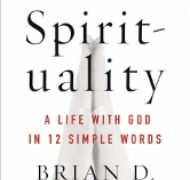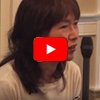Discovering a Practical Spirituality with Brian McLaren
Blog / Produced by The High Calling
In Naked Spirituality, author and former pastor Brian McLaren offers a number of suggestions for developing a practical spirituality that can help seekers find a spiritual balance to their increasingly fractured work lives.
What does it mean to you when people tell you they are spiritual but not religious?
When I probe people for what they mean by this phrase, I find they don’t believe that organized religion or secular science have all the answers. In addition, when they say the word “spiritual,” they believe there’s some kind of mysterious sacredness in the universe. Also, they wish they had some practices to help them be mindful or access that sacredness in some way, like walking in nature or talking with friends.
Why did you divide Naked Spirituality into seasons?
In my 24 years as a pastor and my 40 years as a Christian, I never felt I was given a very good answer to the question of how people actually grow. One of the reasons it’s so hard to talk about the “how” is that it depends on what season we’re in. For example, trees grow different ways in the spring, summer, autumn and winter. Each of those seasons represents growth even though the tree looks very different. This four-season framework has been the most helpful to me in my own spiritual reflection. When I shared this with other people, they responded very warmly.
Briefly describe these four seasons or stages.
Stage one I call “Simplicity.” This is the stage where everything is black and white, right and wrong, up and down. Stage two is “Complexity” where we realize that life is more than dualism. So, now our focus shifts to the complexities of navigating a more difficult and nuanced world. In stage three, which I call “Perplexity,” we begin to realize not only that we don’t have all the answers but that we will never have all the answers. And we have to learn to live with increased ambiguity. Then stage four, I call “Harmony.” That’s where we try to integrate the strengths of the previous stages.
How do you respond to those who claim that similar to Mother Teresa, they used to have a close personal relationship with Jesus but they now feel as though they’re wandering in the wilderness?
One of the reasons I wanted to write this book was to help people who are in stage three. So many people, when they hit stage three, they find themselves unwelcome in their churches because so many people do not understand that this is a natural part of spiritual growth. If people continue to grow, their spiritual life will be very different in one year, five years or twenty years. That’s the way it’s supposed to be. For many people increased spiritual maturity can sometimes mean they no longer feel they have all the answers as they grow in humility. In assessing our own spiritual health and interacting with others in their spiritual journeys, it helps to have a developmental framework in mind.
What does it mean to be naked now?
Many of us feel over the course of our experiences in church and various communities that we keep adding more and more layers of doctrine, ritual and jargon. Eventually, we feel we’re cramped and overburdened. We want to strip things back down to what is really essential and at the heart. The word “naked” suggests a desire for more intimacy rather than cover up.
How can people go through these four stages when they’re working in a secular work environment where their faith has to remain in many ways hidden?
We shouldn’t take thirty minutes for a personal retreat when we’re on the clock and getting paid. But in those three minutes when we’re waiting for a fax to go through or those two minutes where we’re waiting for a meeting to start, we can learn to claim those times and have kind of a check-in with ourselves and God. That can help us get little islands of sanity throughout the day.
In times of loss, a culture of fear seems to take over. For example, people may feel if they help another person get ahead in the workplace, then that person will take their position.
The power of fear can be so great. It’s like an epidemic disease that has deeply embedded the American psyche since 9/11. In many ways, spiritual practices among other things can help us build up our antibodies so we don’t become completely infected by fear and other negative states of being.
How can people practice grace when faced with a hostile working environment but they’re in a position where they can’t just get up and find another job?
When we don’t have the luxury and blessing of working with enjoyable people, we have to then see it as an opportunity to see and expand our capacity for graciousness to difficult people. At some point, we have to turn the focus to our own current incapacity to understand, love and help them. This isn’t to let others off the hook or to blame ourselves but to realize we can’t control them but we can learn to control our reactions. This can help us in our life with God to learn what to ask for—I need greater empathy, self-control, creative responses, and so on. Also, we need to focus on doing the thing we’re paid to do and to let go of the right of an enjoyable work situation. Sometimes we need to say for a season, “If I’m getting paid to do this, I can keep on doing this even if there’s no way to make it enjoyable.”
Where does one find gratitude in one's work given the current economic realities?
In a certain sense the moment of loss can have the potential to be a moment of gratitude. The actual experience of loss can sharpen our capacity for gratitude. If we’re wise, then we won’t only bemoan the loss but also look at all the other things in our lives that we’re taking for granted. For example, if I just lost my job, then at that moment I can appreciate how great that job was.
How can people who feel overwhelmed with work and other responsibilities find the time to develop a spiritual life?
You think for example how this economic downturn has pushed so many people from a very comfortable job into a stressful one. We all get pushed into areas of potential stress and discomfort. I don’t want to sound trite but there is a sense that every single trial brings opportunity in the long run. I don’t trust myself to keep my equilibrium when I get hit by a tsunami. That’s where having some soul friends that I really trust and keep in touch with is invaluable. But when you need those friends the most is not the time to go out and find them. You have to develop those friendships before they’re desperately needed. In good and easy times, developing good friends where you can be frank and forthcoming will really help you during those times when you desperately need those friends.
How does one cultivate soul friends?
We all learn to go through a process of testing relationships to see how safe they are. Some of us err on the side of being too trusting. We pour out too much of our hearts before the other person is worthy of our trust. Others get stuck in a cycle of self-protection because we’ve been hurt.
What do you say to those who pray for guidance in their careers but they find themselves either demoted or out of a job with limited or no prospects in sight?
One of the things I’ve tried to do in this book is help people see there are different kinds of postures of prayer. This question brings up the prayer of petition where we’re asking for what we need. In my experience, one of the great transitions that we go through in petition is moving from an early stage where we’re asking God to rearrange the world to be more amenable to my abilities and preferences. I can think of some of the miraculous spiritual interventions I experienced early in my spiritual journey. But as time goes on, I’ve noticed that the frequency of those experiences goes down not up. Part of the lesson of that is that as time goes on, we have the opportunity to adjust, grow and expand our capacities to face the world. One of the things I talk about in the chapter on petition is the challenge of identifying the strength or capacities that I lack. Instead of asking God to change the reality of the situation, I start to ask God to help me increase my capacity in that area. Also, we often have more power than we realize. If people shut us down in one area, that can turn out to be a gift because it forces us to explore some other areas we haven’t explored.
Where is God for those people who once felt their faith was alive but they no longer feel God's presence?
I think a couple of things are going on. Sometimes there are things in our hearts that we haven’t been able to access and put into words, or we’re afraid that if we put it into words, then it would be unacceptable. For example, I talk about what I call the prayer of rage and refusal where we just complain and express our absolute frustration over the agony that’s going on. That doesn’t feel like holy prayer to a lot of people but I think it’s an essential part of the spiritual life. But then there are other seasons where what our heart needs and wants is to simply be quiet and rest in God’s presence, when we don’t feel the need to use any great words.
What can we learn from the woman at the well (John 4:7-26) that we can apply in our interactions with others at work?
In this story, Jesus says that the time is coming and now is. Spirituality can happen anywhere. That helps people begin to see that their work life is sacred and that spirituality can happen in all dimensions of life. All dimensions of life can be touched by the sacred.
Post by Becky Garrison.





